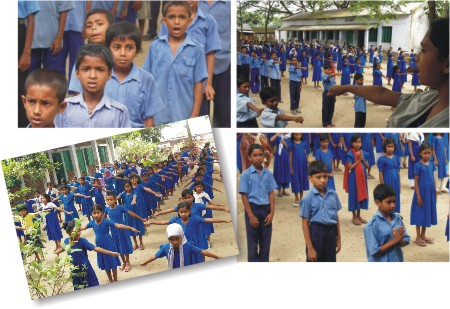 |
|
 |
|
 |
 |
|
 |
|
 |
|
 |
|
 |
|
The advances made in education since independence are a staggering achievement by any standards. Rasheda K. Choudhury writes from the front-lines of the tireless effort to secure for every single boy and girl their right to the tools to make something of their lives.
Education for all:
The people's contribution
It was sometime in the middle of the 1980s -- a coastal village in Bangladesh, just like any other village at that time, was beset with socio-economic constraints like poverty, poor health and nutritional status of the population, lack of water and sanitation facilities, weak physical infrastructure and a general indifference of the local political groups. It didn't have any educational institution, not even a primary school.
A group of young people in that village, aged between 20 and 30 years, felt that education could fulfill their dream of developing the village into a better place to live. But it was not easy. Almost everyone in the village was so poor that they could not afford to build even a primary school. But the indomitable sprit of the youth could not be subdued by such constraints.
They went from door to door asking for contributions. A well-off farmer donated a piece of land, all the other landless and marginal farmers volunteered their labour for construction work. The youth group still needed cash to buy materials, bricks, etc. But they couldn't and didn't stop there. All these young people went to the district hospital, sold their blood, came back with the cash and built the primary school on the donated land with the help of other villagers. A dream came true!
This is the story of Bangladesh. Hundreds of such stories of people, so resilient, so entrepreneurial and so practical in their traditional wisdom, are abundant all over the country. One has to see it to believe it.
A few months back I was accompanying an Australian team of educators on our way to Sylhet to visit a programme of a local NGO offering a package of livelihood skills and basic education programme for school dropouts. My Australian friend saw some young boys making kerosene lamps (locally called "kupee") with the abandoned tins of condensed milk. He exclaimed "Goodness! This is not only livelihood or education, it's plain and simple recycling for which we have to spend a lot of money in Australia. These people are really innovative!"
Probably these are the unique traits of our people that motivated Philip Bowring to write in the May 7, 2005 issue of the International Herald Tribune: "Bangladesh lacks natural resources and good governance and is beset by natural calamites, corruption, and self destructive political infighting, Yet its gross national product persistently maintains a growth rate of 5 percent, well above average for developing countries. It has overtaken India on several social indicators. Its aid dependence has fallen from 6 percent to 1.8 percent of gross domestic product. The answer to the puzzle seems to lie in the triumph of individual and local group initiative over both the elements and institutional failings."
Bangladesh is committed to the goal of achieving Education for All (EFA), the Dakar Framework for Action and the Un Millennium Development Goals (MDGs) by 2015. Its national development objectives and plans are guided by a strategy of poverty reduction and human development in which education, especially at the basic level, has a critical role.
It is evident from various sources and micro-level investigations that primary and secondary education are the two sub-sectors where Bangladesh could celebrate the contribution of its parents, students, teachers, policy makers and planners for an overall recognition of the need for basic education as the tool for human resource development.
Successive governments, despite their political differences and endless fight over many other issues, promoted education, allocated more money, provided free textbooks, food or cash subsidies and continued the policy of affirmative action in favour of girls. National budgets have been increased and substantial external assistance has been mobilized for primary, secondary and vocational, technical education development initiatives.
In addition to many affirmative policies and frameworks like PRSP and the Primary Education Development Programme (PEDP-II), NGOs have pioneered and successfully implemented many programmes to reach the left out, missed out and dropped out groups of children, adolescents and adults, particularly girls and women. Both the PRSP and PEDP-II have acknowledged the need for integrating the still left out groups like the disabled, ethnic minorities, and the hardcore poor into mainstream education.
As a result, improvements have been visible in gross and net enrolment in primary education, reduction in dropout, improvement in completion of the cycle encouraged by the provision for free textbooks to all students, food for education and stipends for poor children as well as stipends and tuition waver for rural girls at the secondary level. This story of Bangladesh, despite being a less developed country with the so-called conservative and traditional socio-cultural setting, achieving gender parity at the primary and secondary levels has stunned the world.
It has become an "example" in the global development discourse. As the World Bank publication on "Bangladesh PRSP Forum Economic Update, Recent Developments and Future Perspectives"(November 2005) described it: "Bangladesh is the only country in South Asia other than Sri Lanka to have achieved parity in male and female enrolments not just at the primary level but also at the secondary level. This is an impressive achievement for a country that is one of the poorest countries in the world, with a per capita GDP just over US$400."
"Female share," as the UNDP-Government of Bangladesh Progress Report on MDGs (February 2005) has pointed out, "in primary school shows an increasing trend since 1992, reaching a ratio of 48:52 in 2002 for female to male primary school enrolment rate. Under the present demographic trends arising from the existing sex ratio in the population, this is the optimum possible ratio, and the challenge now is to maintain the momentum until 2015 and beyond."
The Education Watch Report "Quality with Equality: The Primary Education Agenda" (January 2005) despite raising concerns over the growing inequality in terms of quality of education, maintained that: "Progress in primary education in Bangladesh in the last fifteen years, despite its many deficiencies, is characterised by strengths, which truly can be regarded as points of shining light."
However, although impressive gains in school enrolments and attendance have been achieved, but disparity continues to exist between male and female literacy rates, particularly between rural and urban population. On the one hand, millions of children are getting into overcrowded classrooms demonstrating the fact that the demand has surpassed the supply and poverty is no longer a major barrier if appropriate policies and strategies are in place; on the other hand there are still pockets or regions in Bangladesh where both the school enrolment rate and literacy rates are well below the national overage.
Quality of education at all levels emerges as a major concern negating some of the gains that have been heralded by the global community as a major "success story." Lack of community ownership of education interventions, a generally non-responsive local government, and lack of good governance have become major obstacles to achieve EFA and MDGs goals 2 and 3 despite the efforts put in by millions of poor parents, first generation learners, ill-equipped teachers and institutions. Bangladesh runs one of the major educational administration hierarchies with more than half a million teachers and administrators. Now the challenge for them is not only to sustain the quantitative gains but also to achieve the remaining goal of quality basic education for all its citizens.
Dr. Mahbubul Haque, the world famous economist and social activist once termed South Asia as "one of the most impoverished regions with the most potential for developing into the most dynamic region in the world."
The people of Bangladesh. with all their resilience, productivity, and innovativeness have proved beyond doubt that the country has all the potential to move ahead if strong political will combined with good governance structures, democratic practices, and pragmatic strategies are in place. Let the 21st century be the century of the people and not of politics that undermines the immense potential of the human being.
....................................................
Rasheda K. Choudhury is Director, Campaign for Popular Education (CAMPE).
